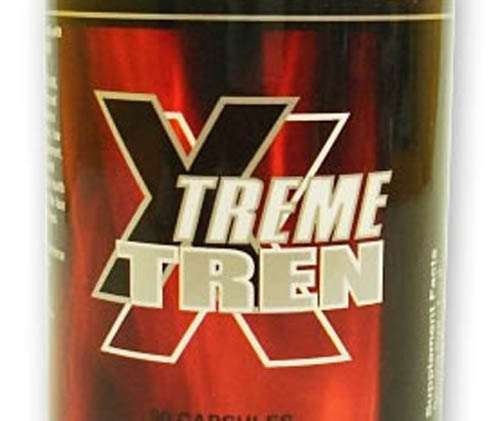
The CBS Early Show investigated anabolic steroid use by high school athletes in Louisiana on March 17-18, 2009. The investigative report by CBS News correspondent Kelly Cobiella targeted two sports supplement products identified as Genetic Edge Technologies Tren-250 and Tri-City Chemicals Xtreme Tren. Cobiella interviewed athletes at Opelousas High School and Eunice High School who used the supplement identified as “tren”. “Tren” contains an allegedly legal “pro-steroidal” ingredient used in a variety of “pro-steroidal” supplements (“High Schoolers Unknowingly Taking Steroids,” March 18).
Don Catlin, the infamous steroid hunter who runs the Anti-Doping Research lab, tested Xtreme Tren and confirmed the presence of estra-4,9-diene-3,17-dione. Catlin also found trace amounts of 19-norandrostenedione that were not listed on the label. “‘Tren’ is not a supplement at all, it masquerades as a supplement but it is really a powerful potent anabolic steroid,” according to Don Catlin.
William Llewellyn, author of the authoritative anabolic steroid reference manual “Anabolics“, clarifies the conditions under which natural steroid ingredients that can be legally sold over the counter.
If a steroid is found in the food supply naturally, and not regulated as a controlled substance, it may be legal to sell as a dietary supplement. The Dietary Supplement Health & Education Act (DSHEA) is intended to protect ingredients that are natural and already consumed by the public. Depending on if you believe the story or the label, tren is either a steroid known as estra-4,9-diene-3,17-dione or estra-4,9,11-triene-3,17-dione . There is no known source for either steroid in nature. I have to agree with Don Catlin’s assessment that tren is not a supplement, but a synthetic designer steroid. Since the designer steroid tren is not natural, it is considered a misbranded drug under federal law.
It is important to note that estra-4,9-diene-3,17-dione is NOT legally defined as an “anabolic steroid” under the Anabolic Steroid Control Act of 1990 and 2004. Instead, it may be classified as a “misbranded drug” instead of a dietary supplement.
The CBS Early Show investigation into anabolic steroid use by high school athletes reveals how the war on steroids will attack the sports supplement industry and the Dietary Supplement Health and Education Act (DSHEA). The first step in any anti-steroid crusade is to frame the problem as one that involves “saving the children” to exploit the public hysteria regarding steroids. Next, they will search for supplement companies that are selling illegal designer steroids in violation of DSHEA. Then, they will try to detect trace contamination of steroids using sensitive measuring equipment even though the contaminants have no physiologic significance. Finally, they will unfairly characterize the supplement industry as totally unregulated and call for changes in the law e.g. the repeal of DSHEA.
DSHEA, the law governing dietary supplements, does not appear to be at fault in this case; it is the lack of enforcement of DSHEA that is problematic. It is important to note that estra-4,9-diene-3,17-dione is NOT legally defined as an anabolic steroid under the Anabolic Steroid Control Act of 1990 and 2004.
The ignorance of journalists reporting news about anabolic steroids is also troubling. The CBS news correspondents discussing the supplements Xtreme Tren and Tren-250 had difficulty finding any indication that the products may have anabolic or steroid-like effects, much less contain steroidal ingredients by looking at the bottle and labeling!
Maggie Rodriguez: Kelly I’m looking at this bottle and it’s so easy to be fooled and no where, that I can see, is there a warning, at least not obvious. Is there anything in the fine print?
Kelly Cobiella: If you read and look closely at the fine print on the bottle you will see some of the side effects that are associated with steroids but you have to …
Maggie Rodriguez: Acne, hair loss, hair growth…
Kelly Cobiella: Right but you have to know what to look for and that might be one red flag… you’ll see buzzwords, legal anabolic, prohormone… problem is we don’t know because none of this is regulated.
The fact that the word “Tren”, the common street name used for the illegal anabolic steroid “trenbolone”,was part of the product name should have been a clue to any athlete or journalist with remote familiarity with anabolic steroids and steroid use. When discussing the dangers of designer steroids, Cobiella was unfamiliar with potential effects and cited a high-school athlete’s self-reported side effects in response. In addition, dietary supplements are regulated by DSHEA contrary to Cobiella’s assertion; the problem is not the lack of regulation but the lack of enforcement.
Part 1 of Kelly Cobiella’s steroid report
Part 2 of Kelly Cobiella’s steroid report
About the author
Millard writes about anabolic steroids and performance enhancing drugs and their use and impact in sport and society. He discusses the medical and non-medical uses of anabolic-androgenic steroids while advocating a harm reduction approach to steroid education.

Leave a Reply
You must be logged in to post a comment.